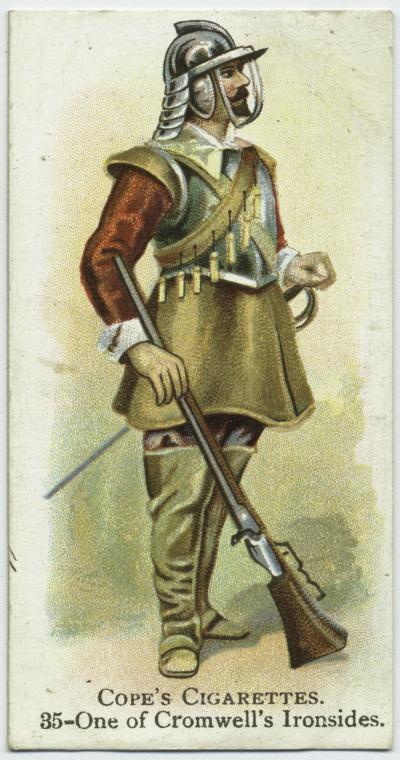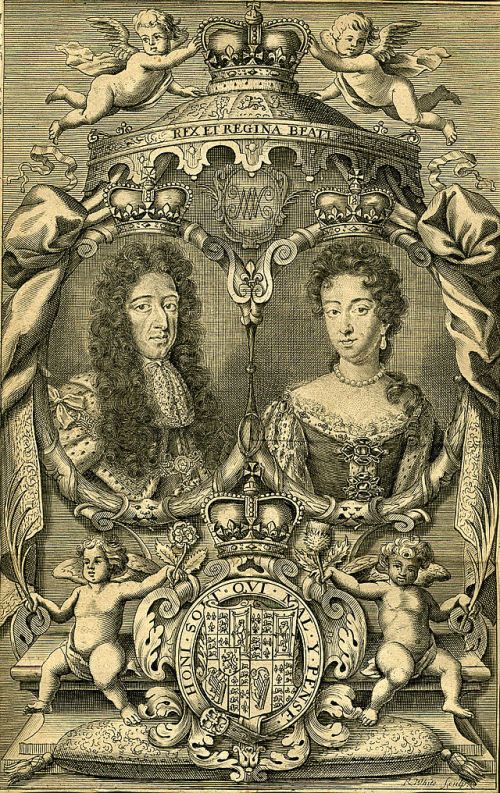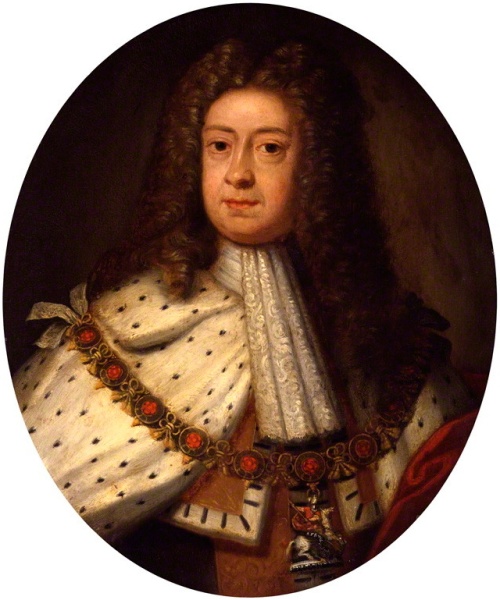There is an interesting article at Townhall.com by Michael Barone titled, Three Hundred Years Later Americans Owe a Debt to King George I.
To most Americans George I would be even more obscure than George III who was King of England during the War for Independence. Yet without a George I there would not have been a George III to turn the world upside down-the song the British Army played as they surrendered at Yorktown.
The Georges were Hanoverian Germans and they secured the British throne through the back door so-to-speak.
As Barone points out the previous monarch was a gal by the name of Queen Anne.

Queen Anne near the end of her life from http://en.wikipedia.org/wiki/Anne,_Queen_of_Great_Britain#mediaviewer/File:Queen_Anne_by_John_Closterman.jpg
Back in those days government and religion were mixed together in an unsavory soup whereby loyalty to the state was often determined by one’s religion. The union of England, Scotland and Ireland had a rather tumultuous history where religion was a bigger deal than it is now.
Queen Anne was a Protestant, meaning Church of England-Anglican, but her dad King James II was Roman Catholic. James II was driven from the throne in 1688-89 in what was called the Glorious Revolution.
James got into trouble because he appointed fellow Catholics to high positions including the military. James decreed he could suspend Parliament and in particular the law that decreed that military officers had to be members of the Church of England. He also had not called for a Parliament for three years and abolished the colonial legislatures in the American colonies.
Looking back hundreds of years we see the issue through the lens of freedom of religion but at the time there was no such thing and such ideas were in the future.
What really bothered Parliament was the fact that the king believed he could ignore the law and do what he pleased. In other words it was a power struggle between those who made law (Parliament) and the head of state (king) who thought he could ignore it when he chose to do so. In those days the balance of power issues we are familiar with (Congress, President, Supreme Court) were still being worked out and Parliament which had gained the majority vote in the English Civil War was not keen on giving up their new-found power.

Cigarette Card featuring one of Oliver Cromwell’s “Ironsides” Heavy Cavalry that were instrumental in winning the the war for Parliament over Charles I and the Royalists.
Parliament feared, rightly so, an absolutist type monarchy like that which was in power in France, a country that would eventually have an incredibly bloody revolution that ultimately would result in the rise of Napoleon Bonaparte. James II was succeeded by Anne’s sister Mary who was married to William of Orange (both Protestants). William and Mary agreed with Parliament that monarchs could not simply suspend the law and that’s where the Founding Fathers got the idea the President would have limited power (Remember that the Founding Fathers were all English and they knew their history.) As a footnote William and Mary College in Virginia is named for the famous pair and Thomas Jefferson attended there.

William and Mary http://en.wikipedia.org/wiki/Anne,_Queen_of_Great_Britain#mediaviewer/File:William%26MaryEngraving1703.jpg
It get s little complicated but stay with me here; it’s important.
Parliament had passed a law in 1701 that barred Catholics and anyone married to a Catholic from being king. Remember, we’re looking back hundreds of years and there is no such thing a state without a state church (a practice that continues today in much of Europe but with far less importance).
The law perpetrated a crisis when Anne died because all her relatives in line for succession were Catholics. Just before Anne died she smelled revolution and fired her pro-Catholic advisers and picked a loyal Protestant who would ensure that succession would go to a Protestant. The Duke of Marlborough (an ancestor of Winston Churchill) would use the military to make sure there was little trouble. There was, but that’s another story.
Eventually the powers that were found a suitable Protestant, a distant cousin of Anne. His name was George Ludwig and a Hanoverian German. He could not speak a word of English.
According to Barone the Hanoverian kings (George I, II and III) were not all that popular and heavily criticized as we begin to see a more obvious freedom of the press and freedom of expression by British citizens. Barone also notes that overall the Hanoverian kings were good for the UK as it enjoyed an economic posterity that rivaled their greatest rival of France.
As for the colonies the George’s practiced a neglect that the colonies rather enjoyed. The colonies tended to rule themselves which they liked and things didn’t come to a head until George III became guilty of over reach but more importantly by refusing to negotiate with those he considered rebels-hence the War of Independence.
Barone does not make the following point but I will.
The US emerged from the War of Independence with strong ideas regarding the balance of power between the various branches of government. The Founders knew what they were doing fearing that an absolutist would once again suspend laws that he or she didn’t like. The Constitution was designed to keep all concerned in their proper place and although it could be messy and time-consuming it has worked pretty well until now.
Now we have a President who uses executive action and statutory neglect to full advantage. He does not enforce laws he does not like and goes around the lawmakers (Congress) every chance he gets. The Senate, one-half of the Congress is complicit in his designs and the other half of Congress (the House of Representatives) is blamed for the executive action run a muck because according to the President “Congress won’t act” yet it cannot because the President’s allies control the Senate.
This may all change in the November elections if both Houses of Congress go conservative and undo much of the damage. If not, we can expect more abuses of power from the Administration and it’s allies in the Senate and in the mainstream press who seem to think an abuse of power will never come back to bite them in the butt.
The US is still rather unique in the way it is set-up. Technically, we are ruled by a document called the Constitution, a document our leaders are supposed to uphold. When our leaders no longer take that seriously what is the Christian to do? The Bible says we are to be loyal to the emperor (1 Pe. 2:13) and every human institution (like our Constitution and civil authority in general). But what if they are in opposition to one another? What if the governors of 26 States uphold the Constitution and the other 24 side with a lawless President. What if Congress remains hopelessly divided and a President, like James II simply decides to do what he pleases? What if?
I do not have all the answers-just the principle that was established so long ago by William and Mary and the English Parliament. We are a nation of laws and the king or President just does not get to do whatever pleases. Limiting the power of the executive branch of government should be a concern to both Democrats and Republicans and the fact that it does appear to concern the Democrats one bit should concern us all.
